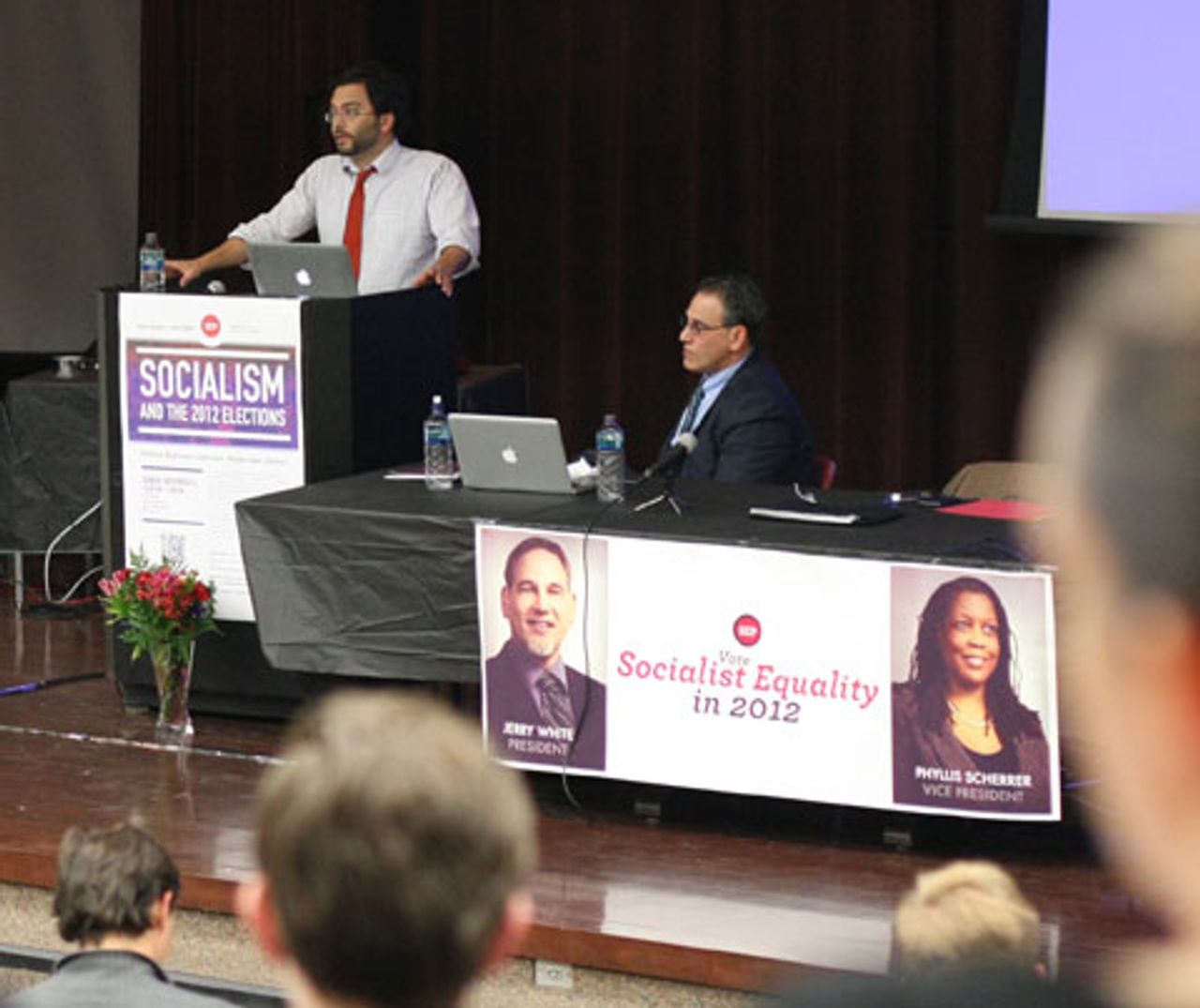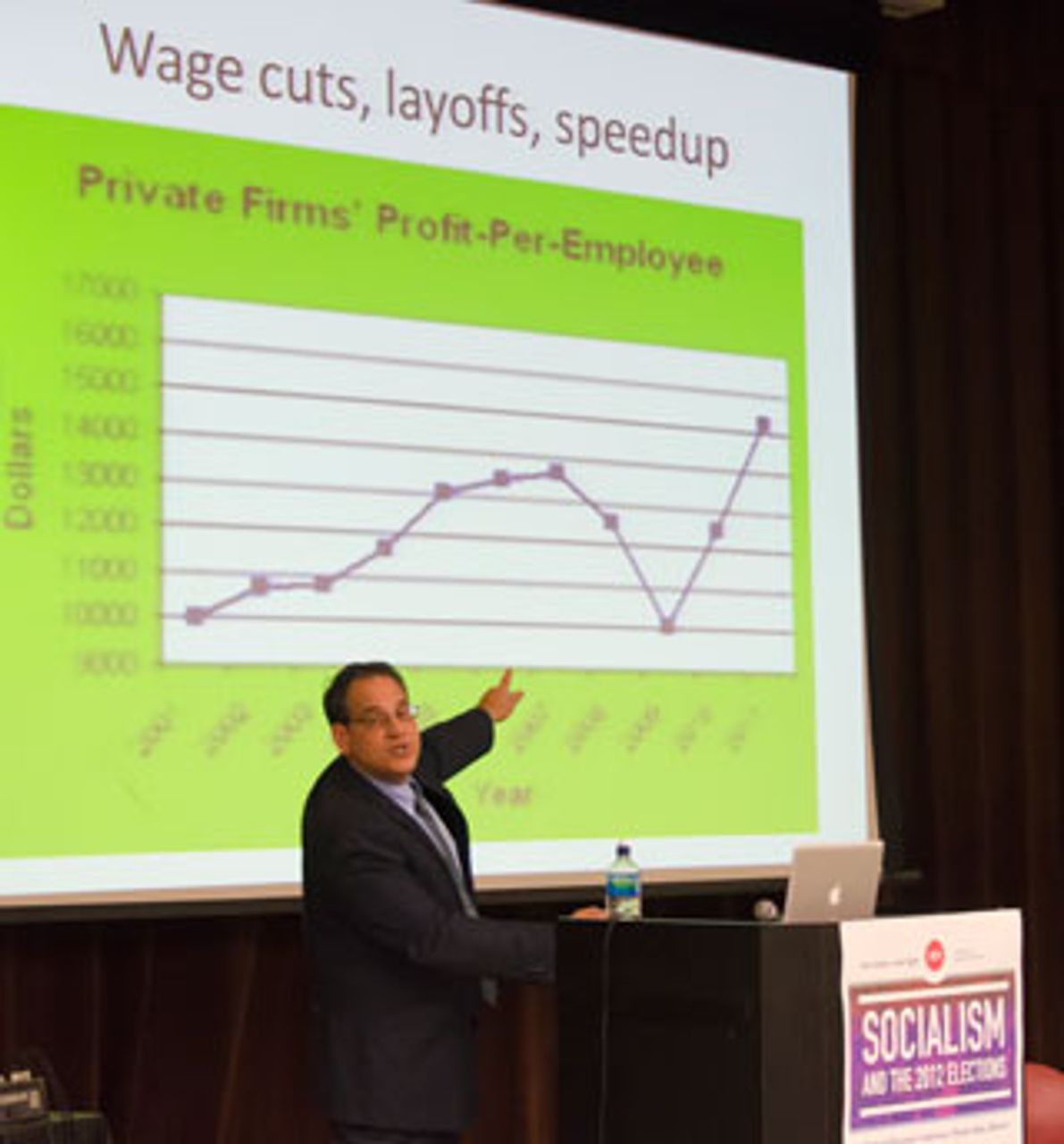The Socialist Equality Party held a regional conference, Socialism and the 2012 Elections, over the weekend at Wayne State University in Detroit, capping the party’s nine-month presidential election campaign. It followed conferences in Los Angeles and Berkeley, California. The meeting drew a wide cross section of working people and young people from across the US Midwest, including auto workers, teachers and college students.
 SEP National Secretary Joseph Kishore opened the conference
SEP National Secretary Joseph Kishore opened the conferenceSEP presidential candidate Jerry White addressed the conference along with SEP National Secretary Joseph Kishore and SEP National Chairman David North. SEP vice presidential candidate Phyllis Scherrer also addressed the meeting remotely from New York City, where a scheduled SEP conference had been canceled due to Hurricane Sandy.
After extensive discussion, delegates to the conference unanimously adopted the resolution “Build the Socialist Equality Party.”
Joseph Kishore gave the opening report in which he introduced the conference resolution. He began by pointing out that the 2012 presidential elections were taking place under conditions of the worst economic crisis since the depression of the 1930s. He noted that the situation facing working people in the United States and Europe belied claims of economic recovery, with working people facing a historic retrogression in their standards of living.
Kishore made a clear warning of what the American ruling class was preparing for after the election, whether Obama or Romney won. This included bipartisan plans to slash trillions from vital social programs, escalate the attack on workers’ living standards and launch new wars against Iran and other countries.
Kishore spoke extensively on the assault on democratic rights being carried out by the Obama administration, which has declared its right to assassinate anyone it accuses of being a terrorist, including American citizens, without judicial review. Pointing to the Washington Post exposé of the administration’s so-called disposition matrix, which institutionalizes the process of targeted assassinations, Kishore said, “Lists are being drawn up. This is not a temporary measure. It is the new modus operandi of the American state, which will continue under Obama and after Obama.”
Kishore emphasized the chasm between the SEP and various liberal and pseudo-left organizations, which were either openly or tacitly supporting the reelection of Obama. These forces, including the Nation publication and the International Socialist Organization, he said, were opposed to any struggle to mobilize the working class against the capitalist system. Instead, they represented the interests of a narrow upper middle-class social layer, tied to the unions, the Democratic Party and American imperialism.
He concluded by urging workers and young people to join the SEP and the International Youth and Students for Social Equality to prepare for the struggles against austerity, war and the destruction of democratic rights in the aftermath of the elections.
 SEP presidential candidate Jerry White speaking
SEP presidential candidate Jerry White speakingJerry White reviewed the experience of the party’s intervention in the 2012 presidential elections. “In terms of its geographic scope and involvement of both the most experienced and the youngest members in their first election campaign, this was, I believe, the most energetic fight for socialism in the American working class in a generation.”
The party anticipated an eruption of struggle by the working class, said White, and had turned aggressively to provide a leadership to the working class. The campaign had visited the picket lines of locked out workers at Cooper Tire in Findlay, Ohio; Caterpillar workers in Joliet, Illinois; Con Edison workers in New York City; striking Quebec students; Detroit city workers and Chicago teachers.
The campaign, said White, represented the intersection of the decades-long fight by the Trotskyist movement in the United States to resolve the crisis of working class leadership with the experiences of the working class itself.
White said his international tour, in which the socialist candidate visited Sri Lanka, Canada, Britain and Germany, was the high point of the campaign. “There was a deep interest among workers about the development of the class struggle in the United States. I was asked if there was a social force in the United States that could challenge US imperialism at its center. I said yes, the American working class. Our party is the only one that bases itself on an understanding of the revolutionary role of the working class.”
In her remarks to the conference, Phyllis Scherrer said, “All of the economic policies pursued by the Obama administration have been aimed at boosting stock market returns and corporate profits, at the expense of the working class in the United States and internationally.”
This, she said, had become abundantly clear in the aftermath of Hurricane Sandy, when power to the New York Stock Exchange was quickly restored while millions throughout the Northeast were abandoned and left without electricity, heat, water and, in many cases, a roof over their heads. “The priorities are clear: Wall street is THE priority, the working class, young people, the elderly and disabled be damned.”
She also reviewed the experience of the Chicago teachers strike, which pitted educators against the Democratic administration of Mayor Rahm Emanuel and the Chicago Teachers Union. “We saw that the greatest obstacle to carrying out a determined struggle was, and is, the organization that claimed to represent the interests of teachers, the CTU. They tied the teachers to the very social force—the Democratic Party machine of Chicago—that was attacking their strike and their struggle to defend public education.”
A lengthy and comprehensive discussion followed the reports. One Chrysler worker attending the conference said that while he agreed with the need for a third party, he planned to vote for Obama as the only realistic alternative. In response, David North, through an extensive review of US history, explained the necessity for the working class to establish its political independence from the two big business parties.
“It would be surprising that if at a meeting in the US no one said he will vote for Obama to keep the Republicans out,” said North.
“We have to explain the lessons of the historical experiences through which workers have passed even if they are not familiar with them. The great problem in the US is the long overdue break by the working class with bourgeois politics.
“Parties represent classes. They represent social interests. What was the cause of the failure of the American working class to build a workers party? Fundamentally it was the rising power of US capitalism, which made the building of a working class party so difficult.”
The conditions that prevented the emergence of independent working class politics in the United States no longer exist, said North. “The working class has seen a deterioration of its conditions of life for 40 years. An auto worker today is making less in real terms than his grandfather made in 1967. If there had been an honest discussion during the election campaign, there would have been an admission that after November 6 there will be a dismantling of Social Security and Medicare to fund a vast expansion of militarism and a violent assault on democratic rights.”
“Our task,” said North, “is to prepare youth and workers politically for the challenges of the next period. The entry of the American working class into politics will be of an explosive character because of its long-delayed development.”
Michelle, a teacher from the Buffalo, New York area, said she had drawn some fundamental lessons since 2008, when she voted for Obama. “I believed that a vote for the Democratic Party would reverse the attacks on teachers and public education carried out during the Bush years. In fact, attacks on teachers were expanded.
“He is there to protect his Wall Street benefactors and prop up the ruling elite, just like the Republicans.”
World Socialist Web Site editorial board member Patrick Martin reviewed the record of the SEP in warning against illusions that the election of the first African American would represent an advance for the working class. “We did not just recently come to the conclusion that Obama was a defender of imperialist interests. Even before the election the WSWS warned that Obama would rapidly disavow his campaign promises.”
WSWS Arts Editor David Walsh discussed the role of the petty bourgeois pseudo-left tendencies such as the International Socialist Organization, which serve as a left flank for the Obama administration. “The 2012 presidential campaign has exposed to many the rotten character of the two-party system. Most importantly, it has helped clarify what sets the SEP apart from every other party. The political vacuum that exists is astounding.
“We represent the working class, the only social force that can revolutionize society.”
At the conclusion of the conference, several attendees expressed interest in joining the Socialist Equality Party and its youth section the International Youth and Students for Social Equality. As well, many workers and young people stayed long afterward to visit the Mehring Books literature table and continue informal discussion.
